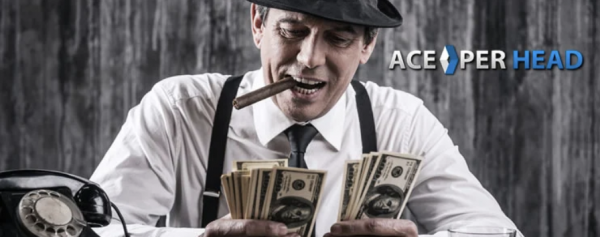Best Software for Bookies: A State-By-State Analysis
85% of adult Americans have gambled at one point in their lives while 60% have done so in the past year. Those numbers are astonishing, to put it mildly.
With this in mind, is it ever any wonder that bookmaking is one of the fastest growing professions in the world today?
Below, we list each U.S. state and the demand rating for the best software available for bookies. Hint: AcePerHead's Pay Per Head software solution is as low as $3 per customer per week.
(From 1=10 with 10 being the best environment of bookies)
Alabama (10) - No regulated sports betting, biggest college football fan base in the U.S with college basketball now enjoying great success here. Advertising everywhere but nowhere to place those bets.
Alaska (6) - While there is no regulated sports betting, there aren't any professional teams here and bookies can only work within a confined area considering how dense the state is versus its relatively sparse population.
Arizona (6) - Arizona offers everything to sports bettors through regulation except that local bookies can take those 18 and up as opposed to the 21 and up requirement for regulated sportsbooks. There are no online casinos, political betting markets and novelty wagering is limited here. Not all bookie software offer these types of gambling options, but those that do, along with a live dealer casino, can certainly compete in this state. Arizona now prohibits bets on college player props. This has boosted the state's rating for making local bookmaking more hospitable.
Arkansas (9) - Arkansas's regulated sportsbook market is limited and not the most appealing. College football is certainly the main sport here. The Razorbacks have a decent enough college basketball team coming into 2025.
California (10) - No regulation and the most populated state makes California one in which some local bookies can thrive without even taking business from other U.S. states.
Colorado (6) - Despite the large number of regulated options, college player prop bets are prohibited here. That offers a tremendous boost to local bookies. If this limitation did not exist, we would rate this state a 4 for independent bookmakers looking to use sportsbook software in Colorado.
Connecticut (6) - NFL betting is big here but, make no mistake, Connecticut is all about Huskies basketball, both men's and women's. There are limitations on betting the Huskies during the regular season that ensures a high demand for local bookies. Regulators ensured that tournament play (March Madness) allows for betting on the Huskies, however.
Delaware (6) - It's a small state that was one of the first to offer legalized sports betting. The books here are not among the more desirable in terms of offerings however. Really the only thing that makes the First State unappealing when it comes to sports betting is its size and lack of professional and college teams.
Florida (8) - Florida is now the third most populous state in the U.S. Its only regulated option is Hard Rock Bet. Granted, if you're going to have a monopoly on sports wagering, it might as well be the Seminoles. This is a good product for sure. But folks love competition and there are some limitations on what can be offered (i.e. Hard Rock Bet can't offer many of the Super Bowl entertainment prop bets available at the offshores). The 2021 compact allows the Seminole Indians to partner with other brands in return for a cut of the revenue, which would drop this rating down to around a 6 should it happen. The state is just so big with so many sports teams that gamblers will always be looking for an edge and a certain percentage will want the anonymity, as well as credit betting, available from an independent bookmaker.
Georgia (10) - No regulated sports betting and one of the best college football teams.
Hawaii (6) - No regulated sports betting. In fact, outside of Utah, Hawaii is the least-friendly gambling state. This allows local bookies to flourish despite the lack of professional teams. There are the Rainbow Warriors in college football as well as a good Little League World Series representation.
Idaho (9) - The only thing keeping Idaho from hitting the 10 mark is its lack of professional sports teams here. There is no regulation of sports betting.
Illinois (8) - Despite being one of the first states to regulate sports betting, Illinois sportsbook apps can't take bets on games featuring local college teams. Betting on college player props is likely to be prohibited as well in 2025.
Indiana (6) - This is a state that offers plenty of competition among the regulated sportsbook apps but college player props are no longer available. Live wagering features are limited to some extent.
Iowa (8) - It was among the first states to regulate sportsbook apps but there is one major drawback: You can't deposit with a credit card. There are limitations on college prop bets and betting on drafts is prohibited.
Kansas (4) - Kansas was late to the party but their are few restrictions when it comes to betting sports here.
Kentucky (3) - Another state that joined the regulated sports gambling market late but has few in the way of any restrictions. The legal age is even 18, thus eliminating any age benefit for local bookies.
Louisiana (7) - Louisiana has regulated sports betting but some of the smaller parishes voted against it. Additionally, the state does not permit betting on college player props. College football and NFL is huge here.
Maine (6) - The regulated sports gambling market in Maine is a mess, thus resulting in some demand for local bookmakers.
Maryland (6) - Regulated sports betting, yes, but Maryland does not permit wagering on college player props.
Massachusetts (7) - A large sports market. While regulation exists, there is no depositing with credit cards. Betting on in-state college teams is also prohibited.
Michigan (3) - Michigan not only offers everything one can ever want with a sportsbook app and some solid land-based casinos, the state has also shown a "zero tolerance" stance when it comes to social casinos and offshore sportsbooks that claim to be able to conduct business here. Bookies need to sleep with one eye open in Michigan. Great college and pro teams but a difficult state for a local bookmaker to navigate.
Minnesota (10) - Regulation is non-existent here, gambling on sports is not.
Mississippi (10) - Sports betting only available in two cities at retail casinos.
Missouri (10 - Subject to Drop in 2025) - Voters very narrowly (by a few hundred votes) approved legalized sports betting here. No known restrictions at this time will likely drop this rating from a 10 to around a 5 as we head into 2025 unfortunately. The Show Me State still has great sports teams and any restrictions will make the difference between a 5 and a 6 rating.
Montana (8) - A solid college football fan base and their regulated sports betting is confined to kiosks with plenty of limitations. The state's population and density is really the only drawback.
Nebraska (10) - No online sports betting regulation although the activity is allowed at local casinos. That's not always convenient for sports gamblers however.
Nevada (3) - Because individuals have to register at casinos as opposed to remotely online, there is some edge for local bookies. The reality is that there are sportsbooks everywhere. Circa takes large bets.
New Hampshire (5) - No pro teams per se, no big college players and there is a regulated market. There's also a monopoly with just one operator, thus offering opportunities for local bookies to thrive.
New Jersey (7) Ample number of regulated sportsbooks as this was the state that got the U.S. Supreme Court to overturn decades of prohibition. Nonetheless, NJ does not allow betting on in-state college teams. Rutgers has gotten better in college football and New Jersey in recent years is becoming a solid player in the world of men''s college basketball. The state will likely ban betting on college player props across the board in 2025. Even if that happens, New Jersey's rating will likely remain at a 7.
New Mexico (9) - New Mexico only allows sports betting at a few select casinos. These are not luxury sportsbooks per se. The state has a solid enough college football representation as well.
New York (8) - Limited bonus options, no betting on in-state schools and one of the highest operating taxes that will be passed down to consumers. New York does not allow betting on college player props.
North Carolina (4) - Great teams but restrictions on regulated sportsbook apps are few and far in between.
North Dakota (7) - There is some good college football and Little League World Series representation but a limited population and no professional sports teams. North Dakota has not regulated sports betting. It's definitely a favorable state for local bookies.
Ohio (6) - Ohio's decision to prohibit player prop bets in college sports across the board has helped boost the state's rating for local bookies. The fact remains, those in Ohio can place any other type of sports bet pretty much everywhere including bars and bowling alleys and even gas stations.
Oklahoma (10) - No sports betting regulation and a solid college sports gambling base.
Oregon (9) - A sports betting monopoly online with no wagering on college sports. This is the home of the No. 1 ranked Oregon Ducks football team so the advantage to local bookies is HUGE.
Pennsylvania (5) - There are so many regulated apps here and you can bet on in-state college teams like Penn State. Some good news is that betting on college player props here is now prohibited.
Rhode Island (9) - The regulated sportsbook market here is awful and there are prohibitions on betting in-state schools (Rhode Island has a solid college basketball presence). Credit cards prohibited for opening an account.
South Carolina (10) - No sports betting regulation and the Gamecocks are solid in both college football and basketball.
South Dakota (8) - Sports betting is regulated onlly at the retail level (not online). No player props or betting on in-state schools. South Dakota enjoys solid representation in college football and the Little League World Series.
Tennessee (8) - Despite regulation, winnings are capped at 90% and that is before taxes. Credit cards are prohibited. And there are no land-based sportsbooks or casinos.
Texas (10) - Outside of California, the very best environment for local bookies to operate with ZERO regulation for sportsbooks and the second most populated state in the union.
Utah (10) - No sports betting regulation and some decent college teams.
Vermont (7) - No betting on in-state teams or player props. The state's small population and lack of professional teams coupled with a regulated market does drive down the rating to a 7.
Virginia (8) - No betting at all on any game involving an in-state team; no player props in any game. Sure there is a regulated market but these restrictions make being a bookie here quite advantageous.
Washington (10) - The regulated sports betting market here is confined to casinos with online sportsbook apps unavailable. This type of environment drives interest in betting online even further and that's where local bookies have the ability to thrive. Not to mention Washington is home to some very good college and pro teams.
West Virginia (6) - West Virginia will no longer be permitting bets on college player props.
Wisconsin (10) - Only retail sports betting is regulated. No sportsbook apps. This makes for a very favorable environment for local bookmakers in a state that's home to some great college and pro teams.
Wyoming (3) - The smallest population and a state that regulated sportsbook apps. It's not the most condusive enironment for a local bookie.
|
|
















